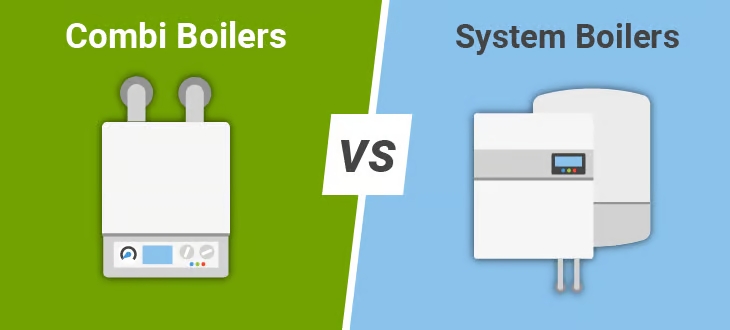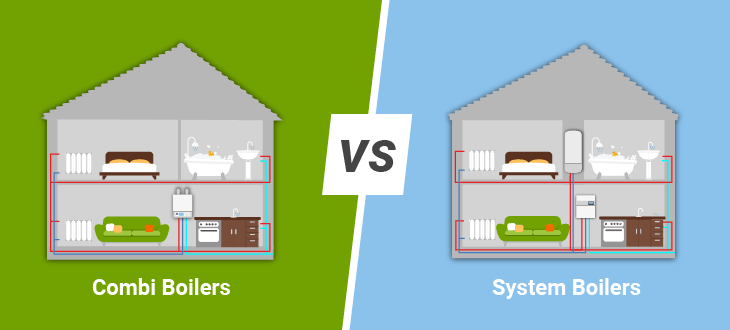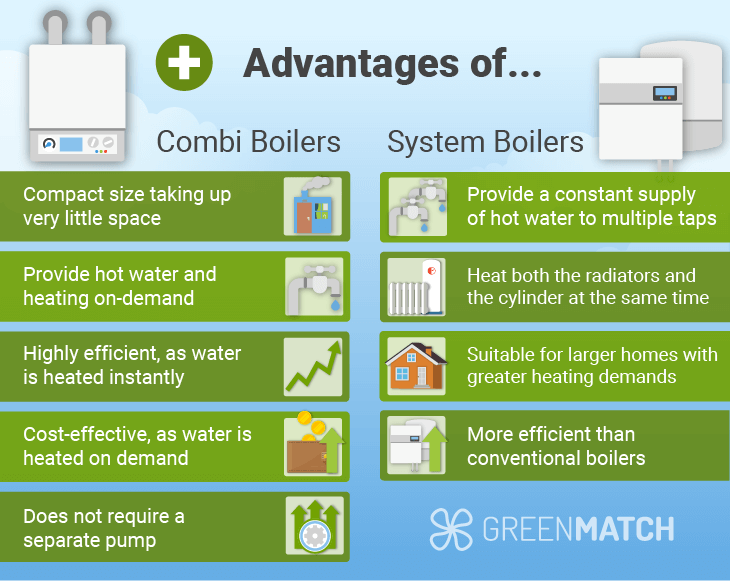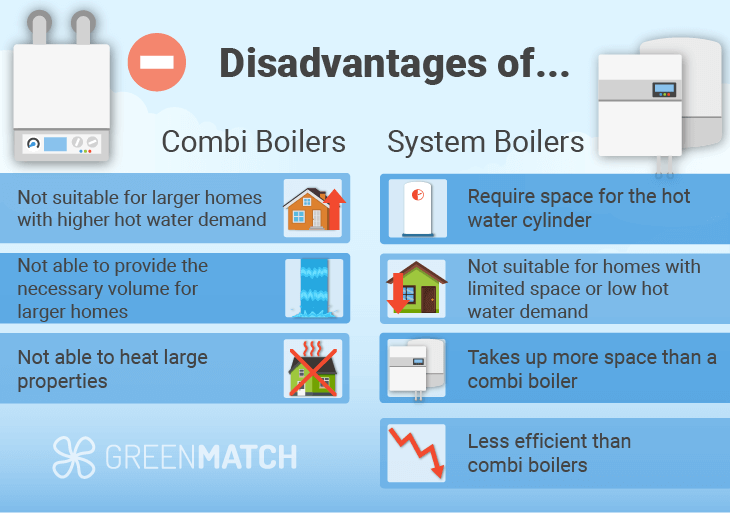Answer these simple questions and we will find you the BEST prices
Which type of solar quotes do you need?
It only takes 30 seconds
100% free with no obligation

Get up to 3 quotes by filling in only 1 quick form

Slash your energy bills by installing an energy efficient boiler

We’ve helped over 500,000 homeowners reduce their carbon footprint
- GreenMatch
- Boilers
- Combi Boiler vs System Boiler
Combi Boiler vs System Boiler: Prices, Pros + Cons and More


Has the search “combi boiler vs system boiler” been sitting in your browsing history for a while now? You’ve come to the right place! In this article, we’ll guide you through the differences between both boilers so you can rest assured you’re making the best decision for your home.
This article will dive into the two types of boilers and discuss the main differences between them to guide you during the decision-making process. These two might look alike on the outside, but they’ve got some functional surprises up their sleeves.
When done alone, finding a heating engineer can take hours of browsing for local heating experts, going through reviews, and eventually calling them to jot down their prices. Sounds tiring, long and stressful, doesn’t it?
Thankfully, there’s a stress-free shortcut you can take by completing our 30-second form. We’ll connect you with up to 3 local heating engineers who, in their turn, will provide you with 3 free boiler quotes. Compare the quotes with no pressure to place any orders. Click below to get started.
- Quotes from local engineers
- Payment by finance available
- Save up to £975
It only takes 30 seconds



- What are combi and system boilers?
- Key differences between combi boiler and system boiler
- Combi boiler vs system boiler cost: prices in 2025
- System boiler vs combi boiler running costs
- Is a combi boiler cheap to run?
- Advantages of combi boilers vs system boilers
- Disadvantages of combi boilers vs system boilers
- Combi vs system boiler efficiency
- Combi boiler or system boiler: Which one is better?
- FAQ
What are combi and system boilers?

A combi boiler, also known as a combination boiler, is a compact heating system that efficiently supplies both heating and hot water from a single unit. When a faucet is activated, it instantly heats water directly from the mains. This eliminates the need for a hot water storage cylinder or a cold water storage tank in the loft which is perfect for homes with restricted space or minimal hot water needs.
A system boiler is commonly found in larger homes where there is a higher demand for heating and hot water. In contrast to combi boilers, which heat water on demand, system boilers come with a water cylinder, allowing them to provide a continuous supply of hot water throughout the house.
Combi boilers and system boilers can be suitable for both central heating and domestic hot water supply. Integrating underfloor heating is possible with a combi boiler, however, it might require adjustments like a two-port valve.
Similarly, system boilers can be used for underfloor heating installations, working in conjunction with a separate hot water cylinder that provides the necessary heat. However, system boilers may also require some modifications like parameters of supply water and screed thickness or adjusting the layout and shaping of heating pipes to integrate with underfloor heating systems.
| Feature | Combi boiler | System boiler |
|---|---|---|
| Hot water storage | No | Yes |
| How hot water is provided | On-demand | From a hot water cylinder |
| Suitable for | Smaller homes with one or two bathrooms, where hot water is used at different times | Larger homes with three or more bathrooms, or where multiple people use hot water at the same time |
| Space requirements | Compact | Requires more space for the hot water cylinder |
| Underfloor heating | Yes, but may require some adjustments | Yes, but may require some modifications |
System boiler vs combi boiler: Key differences
In making the decision between a combi boiler and a system boiler, several factors come into play, including the heating and hot water requirements of the household, the size of the property, the number of bathrooms or your budget.
| Specs | Combi boiler | System boiler |
|---|---|---|
| Size HxWxD(cm) |
70x40x30–85x60x40 | 60x40x30–80x60x40 |
| Cylinder | No separate cylinder; heat water on demand. | Have a separate cylinder for storing and supplying hot water. |
| Heating capabilities | Provide heating and hot water on demand. | Can supply a constant flow of hot water to multiple taps and showers. Can heat radiators and the cylinder simultaneously. |
| Efficiency | 92%–94% | 85%–92% |
| Lifespan | 10 to 15 years | 15 to 20 years |
Combi boilers are a great fit for smaller homes with restricted space and moderate hot water demands and in the case of electric combi boilers, they can reach efficiency rates of 99%-100%.
Conversely, system boilers are more appropriate for larger homes with greater heating needs and a necessity for simultaneous hot water supply to multiple outlets.
Therefore, specifically looking for expensive or cheap boilers isn’t the best approach. The final take on choosing between a combi or system boiler should be after your particular housing situation, heating needs and water demands.
Combi boiler vs system boiler cost: prices in 2024
The cost of a combi or system boiler varies depending on brand, model, size, and complexity of installation. For example, boilers that use natural gas might require a gas line installation and electric combi boilers may need a dedicated electrical circuit which can add up to the installation total.
Moreover, if you decide to relocate a system boiler, the cost of moving a boiler of this type will be higher since it comes with a water cylinder. This means higher labour charges or spending on additional materials.
| Boiler type | Average upfront cost | Average installation cost |
|---|---|---|
| Combi boiler | £500 - £3,000 | £300 - £500 |
| System boiler | £1,800 - £2,800 | £300 - £500 |
Generally, you should account for £900–£3,500 to buy a combi boiler and have it installed. Prepare to pay £2,100–£3,300 for the same procedure with a system boiler. Whichever boiler you choose, the initial investment is nowhere near cheap.
But there’s a solution for that. The UK government offers boiler grants that can help you save quite a few pennies while getting a new boiler for your home. This way, getting a boiler becomes pretty affordable for anyone.
However, the figures in the table are just rough estimates and don’t include additional spending. You’ll need to consult a boiler expert for professional advice. They will help you narrow down the new boiler cost for your specific requirements and housing situation.
And for the speediest advice and best prices, you need to seek advice from local boiler suppliers and installers. Yet finding trusted and experienced experts is a stressful and daunting task when done alone. Hours (or even days!) of browsing, sifting through the reviews and calling the installers is unlikely something you’d like to occupy yourself with after work or at the weekend.
Thankfully, GreenMatch can make your life easier. Just complete our 30-second form by answering several questions about your boiler project. We’ll take it from there and connect you with up to 3 heating installers in your area. Compare their quotes with no need to pay for any services or place any orders. Click the button below to begin.
- Quotes from local engineers
- Payment by finance available
- Save up to £975
It only takes 30 seconds



System boiler vs combi boiler running costs
When calculating the running expenses of a combi boiler vs a system boiler, it's crucial to take into account factors such as the boiler’s energy efficiency, water usage and fuel cost. A gas-based system or combi boiler will result in lower running costs than the electric one due to lower energy prices.
As of October 2023, the energy unit price cap is the following:
| Fuel type | Price (pence per kW)* |
|---|---|
| Electricity | £0.27 (daily standing charge £0.53) |
| Gas | £0.07 (daily standing charge £0.30) |
Together with that, your water demand and boiler’s energy consumption are crucial in determining the running costs. Put simply, the more hot water your home needs, the more you’ll pay for running your boiler.
To calculate the running costs of both combi and system boilers, several factors must be considered. For example, let’s assume that we have a combi boiler with an annual energy consumption of 12,000 kWh and taking into account current gas prices, the running costs of a combi boiler will amount to £840 per year, not taking into account daily standing charges.
Similarly, for a system boiler with an annual consumption of 12,000 kWh and with current gas prices, the running costs will amount to £840 per year excluding daily standing charges.
You can calculate the running costs using the formula below
| Boiler output rating in kW x current gas price per kW* |
|---|
Is a combi boiler cheap to run?
Combi boilers are more energy efficient so they can be potentially cheaper to run. However, this greatly depends on your hot water and domestic heating consumption. A system boiler may end up being cheaper if you use more hot water regularly since they have a storage tank. Combis will waste more water and electricity when heating the water as it flows on demand.
This can be an issue for large volumes of water so the main consideration is your home size and water demand.
To eliminate any confusion regarding the running costs of a boiler and for the most informed decision, it’s highly recommended to consult a heating professional.
Advantages of combi boilers vs system boilers

Both combi boilers and system boilers come with their own set of advantages and disadvantages. Combi boilers offer a space-saving design, instant hot water on demand, and high efficiency, making them perfect for smaller homes.
On the other hand, system boilers can supply hot water to multiple taps and showers simultaneously, becoming suitable for larger homes with greater heating needs. Moreover, even if they are less efficient than combi boilers, they are more efficient than conventional boilers.
Disadvantages of combi boilers vs system boilers

As mentioned earlier, both types of boilers present their own particular advantages and disadvantages. Combi boilers may struggle to meet the demand of larger properties and simultaneous hot water usage.
Furthermore, system boilers require additional space for a separate hot water cylinder, which may be a drawback for homes with a limited amount of space.
Understanding these pros and cons is crucial in determining the best boiler type that fits specific household needs. This is something that a professional installer can help you with. Yet how time-consuming and stressful can finding a trusted engineer be if done alone? It could take hours or even days of browsing, checking installers’ reviews and reaching out to actual heating experts.
Fortunately, we can help you find a vetted boiler installer with no hassle. Simply fill out our 30-second form and we’ll take it from there. We’ll arm you with up to 3 stress-free quotes from local heating experts. Simply compare the quotes with no obligation to accept any of them. Our service is free and non-binding. Click below to begin.
- Quotes from local engineers
- Payment by finance available
- Save up to £975
It only takes 30 seconds



Combi vs system boiler efficiency
Combi boilers are the newest type of boiler, and their installation boasts an efficiency rating of at least 92%. Modern electric combi boilers might reach an efficiency as high as 99%–100%. This enhanced efficiency stems from their ability to heat water on demand, eliminating the need for a storage tank.
As a result, they are considered highly efficient. In fact, according to the Energy Saving Trust, replacing an old boiler with an A-rated combi boiler can lead to energy bill savings of up to 40%.
Bearing in mind that the average UK household energy bill is £1,277 per year, replacing your old boiler with an A-rated combi boiler can result in energy bill savings of £511 per year.
Nevertheless, it is important to note that the amount of money that you save by replacing your old boiler will depend on several factors including age, efficiency and the type of boiler among others
Similar to combi boilers, condensing boiler efficiency of system units is also required to reach at least 92%. Their efficiency can be further optimised by employing various heating controls like thermostats and timers. This adaptability allows them to operate at high-efficiency levels.
However, it's essential to note that system boilers require a separate hot water cylinder, which can lead to some heat loss and may slightly reduce overall efficiency when compared to combi boilers.
Combi boiler or system boiler: Which one is better?
So, is a combi better than a system boiler? Ultimately, the decision between a system boiler or a combi boiler hinges on your home's unique requirements. If you have modest hot water needs and seek a contemporary and space-saving solution, a combi boiler may be the preferable choice.
However, if you have higher hot water demands and require the best combi boiler for a large house, a system boiler might be a better fit, even if it entails slightly higher installation costs.
We hope you have found this article helpful in the boiler comparison process and now you have a clearer picture of the prices, running costs and possible roadblocks.
However, to make the most informed choice, it is advisable to seek guidance from a professional heating engineer or boiler specialist who can assess your home's specific needs and recommend the optimal type of boiler for you.
GreenMatch has got your back! Answer a few simple questions about your boiler project and we’ll connect you with up to 3 local heating experts near you. It will take less than a minute and is free of charge. Compare the offered quotes to find the most suitable price. Click the button below to get started.
- Quotes from local engineers
- Payment by finance available
- Save up to £975
It only takes 30 seconds



FAQ
Yes, combi boilers are generally considered to be more efficient than system boilers. They have a higher minimum efficiency requirement by law and provide hot water on demand, resulting in potential energy savings.
As much as we’d love to answer “yes” or “no,” yet, we’re not a magic 8 ball. Switching from a system boiler to a combi depends on your specific needs and circumstances like hot water demand, budget, and available space, in some cases resolved by a system or a combi boiler.
Both system boilers and combi boilers can be used for underfloor heating. System boilers are typically larger and better suited for larger properties, while combi boilers have a second heat exchanger for central heating and can be used for underfloor heating as well.
No, a combi boiler cannot be used as a system boiler. Combi boilers heat water on demand, while system boilers store hot water in a cylinder, meaning that a combi boiler would not be able to provide enough hot water for multiple taps and showers simultaneously, whereas a system boiler can.
Combi boilers are more energy-efficient and better suited for smaller properties due to their compact design, while system boilers are better suited for larger properties with greater hot water needs. The final decision will ultimately depend on your own personal circumstances.
Combi boilers are more energy-efficient for low hot water consumption, while system boilers are better for high hot water consumption. Therefore, determining which one is cheaper to run will greatly depend on your hot water consumption.


We strive to connect our customers with the right product and supplier. Would you like to be part of GreenMatch?

- Combi Boiler vs System Boiler: Prices, Pros + Cons & More
- What are combi and system boilers?
- Key differences between combi boiler and system boiler
- Combi boiler vs system boiler cost: prices in 2025
- System boiler vs combi boiler running costs
- Is a combi boiler cheap to run?
- Advantages of combi boilers vs system boilers
- Disadvantages of combi boilers vs system boilers
- Combi vs system boiler efficiency
- Combi boiler or system boiler: Which one is better?
- FAQ
